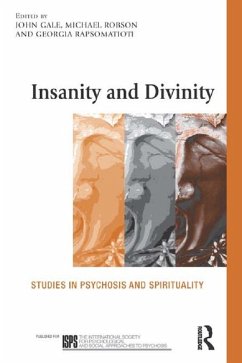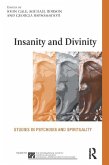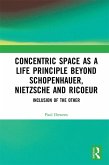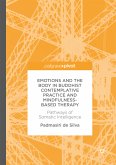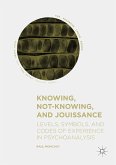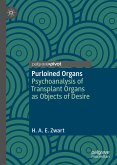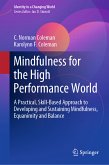Insanity and Divinity (eBook, PDF)
Studies in Psychosis and Spirituality
Redaktion: Gale, John; Rapsomatioti, Georgia; Robson, Michael
47,95 €
47,95 €
inkl. MwSt.
Sofort per Download lieferbar

24 °P sammeln
47,95 €
Als Download kaufen

47,95 €
inkl. MwSt.
Sofort per Download lieferbar

24 °P sammeln
Jetzt verschenken
Alle Infos zum eBook verschenken
47,95 €
inkl. MwSt.
Sofort per Download lieferbar
Alle Infos zum eBook verschenken

24 °P sammeln
Insanity and Divinity (eBook, PDF)
Studies in Psychosis and Spirituality
Redaktion: Gale, John; Rapsomatioti, Georgia; Robson, Michael
- Format: PDF
- Merkliste
- Auf die Merkliste
- Bewerten Bewerten
- Teilen
- Produkt teilen
- Produkterinnerung
- Produkterinnerung

Bitte loggen Sie sich zunächst in Ihr Kundenkonto ein oder registrieren Sie sich bei
bücher.de, um das eBook-Abo tolino select nutzen zu können.
Hier können Sie sich einloggen
Hier können Sie sich einloggen
Sie sind bereits eingeloggt. Klicken Sie auf 2. tolino select Abo, um fortzufahren.

Bitte loggen Sie sich zunächst in Ihr Kundenkonto ein oder registrieren Sie sich bei bücher.de, um das eBook-Abo tolino select nutzen zu können.
An enlightening and insightful look at the connections between spirituality and psychosis from the perspectives of a number of religions.
Contains insights from religious writers and thinkers as well as from those who have experienced psychosis and religious experiences.
- Geräte: PC
- mit Kopierschutz
- eBook Hilfe
- Größe: 3.16MB
Andere Kunden interessierten sich auch für
![Insanity and Divinity (eBook, ePUB) Insanity and Divinity (eBook, ePUB)]() Insanity and Divinity (eBook, ePUB)47,95 €
Insanity and Divinity (eBook, ePUB)47,95 €![The Phenomenology of Sex, Love, and Intimacy (eBook, PDF) The Phenomenology of Sex, Love, and Intimacy (eBook, PDF)]() Susi FerrarelloThe Phenomenology of Sex, Love, and Intimacy (eBook, PDF)33,95 €
Susi FerrarelloThe Phenomenology of Sex, Love, and Intimacy (eBook, PDF)33,95 €![Concentric Space as a Life Principle Beyond Schopenhauer, Nietzsche and Ricoeur (eBook, PDF) Concentric Space as a Life Principle Beyond Schopenhauer, Nietzsche and Ricoeur (eBook, PDF)]() Paul DownesConcentric Space as a Life Principle Beyond Schopenhauer, Nietzsche and Ricoeur (eBook, PDF)41,95 €
Paul DownesConcentric Space as a Life Principle Beyond Schopenhauer, Nietzsche and Ricoeur (eBook, PDF)41,95 €![Emotions and The Body in Buddhist Contemplative Practice and Mindfulness-Based Therapy (eBook, PDF) Emotions and The Body in Buddhist Contemplative Practice and Mindfulness-Based Therapy (eBook, PDF)]() Padmasiri De SilvaEmotions and The Body in Buddhist Contemplative Practice and Mindfulness-Based Therapy (eBook, PDF)44,95 €
Padmasiri De SilvaEmotions and The Body in Buddhist Contemplative Practice and Mindfulness-Based Therapy (eBook, PDF)44,95 €![Knowing, Not-Knowing, and Jouissance (eBook, PDF) Knowing, Not-Knowing, and Jouissance (eBook, PDF)]() Raul MoncayoKnowing, Not-Knowing, and Jouissance (eBook, PDF)105,95 €
Raul MoncayoKnowing, Not-Knowing, and Jouissance (eBook, PDF)105,95 €![Purloined Organs (eBook, PDF) Purloined Organs (eBook, PDF)]() H. A. E. ZwartPurloined Organs (eBook, PDF)40,95 €
H. A. E. ZwartPurloined Organs (eBook, PDF)40,95 €![Mindfulness for the High Performance World (eBook, PDF) Mindfulness for the High Performance World (eBook, PDF)]() C. Norman ColemanMindfulness for the High Performance World (eBook, PDF)40,95 €
C. Norman ColemanMindfulness for the High Performance World (eBook, PDF)40,95 €-
-
-
An enlightening and insightful look at the connections between spirituality and psychosis from the perspectives of a number of religions.
Contains insights from religious writers and thinkers as well as from those who have experienced psychosis and religious experiences.
Contains insights from religious writers and thinkers as well as from those who have experienced psychosis and religious experiences.
Dieser Download kann aus rechtlichen Gründen nur mit Rechnungsadresse in A, B, BG, CY, CZ, D, DK, EW, E, FIN, F, GR, HR, H, IRL, I, LT, L, LR, M, NL, PL, P, R, S, SLO, SK ausgeliefert werden.
Produktdetails
- Produktdetails
- Verlag: Taylor & Francis eBooks
- Seitenzahl: 288
- Erscheinungstermin: 24. Juli 2013
- Englisch
- ISBN-13: 9781135045432
- Artikelnr.: 39191183
- Verlag: Taylor & Francis eBooks
- Seitenzahl: 288
- Erscheinungstermin: 24. Juli 2013
- Englisch
- ISBN-13: 9781135045432
- Artikelnr.: 39191183
- Herstellerkennzeichnung Die Herstellerinformationen sind derzeit nicht verfügbar.
John Gale is a former Benedictine monk who later trained as a psychotherapist and is now CEO of the charity Community Housing and Therapy. He is particularly interested in the interface between philosophy, spirituality and psychoanalysis. Michael Robson is the Director of Studies in Divinity at St Edmund's College, Cambridge. He is the author of a number of books and editor of The Cambridge Companion to Francis of Assisi. Georgia Rapsomatioti is a community mental health advocate who previously worked at Community Housing and Therapy as deputy manager at Lexham House and senior therapist at Highams Lodge. She has an interest in Lacanian psychoanalysis, trauma and psychosis.
Dedication. Contents. Editor's Biographies. Editors and Contributors. Foreword. Preface. Acknowledgements. Part 1: Psychoanalysis
Belief and Mysticism. Gale
Fragments of Madness and Delusion. Gale
From Beyond Speech to Non-inscription - Sprirt and Psyche in the Philosophy of Psychoanalysis. Mannu
Freud Madness and the Delusion of Religious Belief. Mackenna
Jung's Divine Madness. Part 2: Anthropology
History and Hagiography. Gale
Conversion and the Fragmented Body. Cantlie
Divine Madness: Tantris Ascetics on the Cremation Ground in Tarapith
Birbhum District
West Bengal. Robson
Models of Wisdom and Sanctity: The Conversion of Saint Francis of Assisi. Reddy
Spiritual Conversion in the Bhagavad-Gita. Gale
Did Augustine Foreshadow Psychoanalysis? Bomford
Mystical Theology
Mysticism and Madness. Part 3: Psychology
Psychosis and Religious Experience. Gale
Religion
Spirituality and the Experience of Psychosis. Rapsomatioti
Spirituality and the Psychotic Subject in the Thought of Lacan. Autobiographical Accounts of a Religious Psychosis. Unterrainer
Dimensions of Religious/Spiritual Well-being and the Psychotic Experience: Empirical Results and Perspectives. Appendix. Glossary of Lacanian Terms.
Belief and Mysticism. Gale
Fragments of Madness and Delusion. Gale
From Beyond Speech to Non-inscription - Sprirt and Psyche in the Philosophy of Psychoanalysis. Mannu
Freud Madness and the Delusion of Religious Belief. Mackenna
Jung's Divine Madness. Part 2: Anthropology
History and Hagiography. Gale
Conversion and the Fragmented Body. Cantlie
Divine Madness: Tantris Ascetics on the Cremation Ground in Tarapith
Birbhum District
West Bengal. Robson
Models of Wisdom and Sanctity: The Conversion of Saint Francis of Assisi. Reddy
Spiritual Conversion in the Bhagavad-Gita. Gale
Did Augustine Foreshadow Psychoanalysis? Bomford
Mystical Theology
Mysticism and Madness. Part 3: Psychology
Psychosis and Religious Experience. Gale
Religion
Spirituality and the Experience of Psychosis. Rapsomatioti
Spirituality and the Psychotic Subject in the Thought of Lacan. Autobiographical Accounts of a Religious Psychosis. Unterrainer
Dimensions of Religious/Spiritual Well-being and the Psychotic Experience: Empirical Results and Perspectives. Appendix. Glossary of Lacanian Terms.
Dedication. Contents. Editor's Biographies. Editors and Contributors. Foreword. Preface. Acknowledgements. Part 1: Psychoanalysis
Belief and Mysticism. Gale
Fragments of Madness and Delusion. Gale
From Beyond Speech to Non-inscription - Sprirt and Psyche in the Philosophy of Psychoanalysis. Mannu
Freud Madness and the Delusion of Religious Belief. Mackenna
Jung's Divine Madness. Part 2: Anthropology
History and Hagiography. Gale
Conversion and the Fragmented Body. Cantlie
Divine Madness: Tantris Ascetics on the Cremation Ground in Tarapith
Birbhum District
West Bengal. Robson
Models of Wisdom and Sanctity: The Conversion of Saint Francis of Assisi. Reddy
Spiritual Conversion in the Bhagavad-Gita. Gale
Did Augustine Foreshadow Psychoanalysis? Bomford
Mystical Theology
Mysticism and Madness. Part 3: Psychology
Psychosis and Religious Experience. Gale
Religion
Spirituality and the Experience of Psychosis. Rapsomatioti
Spirituality and the Psychotic Subject in the Thought of Lacan. Autobiographical Accounts of a Religious Psychosis. Unterrainer
Dimensions of Religious/Spiritual Well-being and the Psychotic Experience: Empirical Results and Perspectives. Appendix. Glossary of Lacanian Terms.
Belief and Mysticism. Gale
Fragments of Madness and Delusion. Gale
From Beyond Speech to Non-inscription - Sprirt and Psyche in the Philosophy of Psychoanalysis. Mannu
Freud Madness and the Delusion of Religious Belief. Mackenna
Jung's Divine Madness. Part 2: Anthropology
History and Hagiography. Gale
Conversion and the Fragmented Body. Cantlie
Divine Madness: Tantris Ascetics on the Cremation Ground in Tarapith
Birbhum District
West Bengal. Robson
Models of Wisdom and Sanctity: The Conversion of Saint Francis of Assisi. Reddy
Spiritual Conversion in the Bhagavad-Gita. Gale
Did Augustine Foreshadow Psychoanalysis? Bomford
Mystical Theology
Mysticism and Madness. Part 3: Psychology
Psychosis and Religious Experience. Gale
Religion
Spirituality and the Experience of Psychosis. Rapsomatioti
Spirituality and the Psychotic Subject in the Thought of Lacan. Autobiographical Accounts of a Religious Psychosis. Unterrainer
Dimensions of Religious/Spiritual Well-being and the Psychotic Experience: Empirical Results and Perspectives. Appendix. Glossary of Lacanian Terms.
